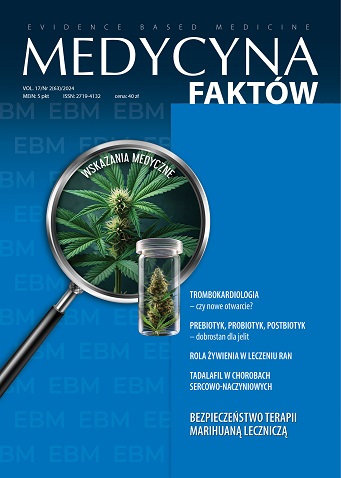Kwas acetylosalicylowy w prewencji sercowo-naczyniowej. Czy dawka może mieć znaczenie? Artykuł przeglądowy
##plugins.themes.bootstrap3.article.main##
Abstrakt
Kwas acetylosalicylowy jest nadal najczęściej stosowanym lekiem przeciwpłytkowym i odgrywa istotną rolę w terapii chorób sercowo-naczyniowych: ostrego zespołu wieńcowego, przewlekłego zespołu wieńcowego, udaru mózgu, chorób tętnic obwodowych. Stosowany jest zwykle w dawce 75–100 mg, a dobór dawki powinien uwzględniać profil pacjenta: jego masę ciała, obecność cukrzycy oraz ryzyko zdarzeń niedokrwiennych i krwotocznych. Optymalne dawkowanie jest szczególnie istotne w kontekście zagadnienia aspirynooporności. Bardzo ważne są również możliwość poprawienia długoterminowej współpracy pacjentów wymagających stosowania kwasu acetylosalicylowego i sposób zapobiegania stosunkowo częstemu problemowi nietolerancji leku ze strony przewodu pokarmowego.
##plugins.themes.bootstrap3.article.details##
Copyright © by Medical Education. All rights reserved.
Bibliografia
2. Visseren FLJ, Mach F, Smulders YM et al.; ESC National Cardiac Societies; ESC Scientific Document Group. 2021 ESC Guidelines on cardiovascular disease prevention in clinical practice. Eur Heart J. 2021; 42(34): 3227-337.
3. Baigent C, Blackwell L, Collins R et al. Antithrombotic Trialists’ (ATT) Collaboration. Aspirin in the primary and secondary prevention of vascular disease: collaborative meta-analysis of individual participant data from randomised trials. Lancet. 2009; 373(9678): 1849-60.
4. Antithrombotic Trialists’ Collaboration. Collaborative meta-analysis of randomised trials of antiplatelet therapy for prevention of death, myocardial infarction, and stroke in high risk patients. BMJ 2002; 324(7329): 71-86.
5. Bowman L, Mafham M, Wallendszus K et al.; ASCEND Study Collaborative Group. Effects of aspirin for primary prevention in persons with diabetes mellitus. N Engl J Med. 2018; 379(16): 1529-39.
6. Seidu S, Kunutsor SK, Sesso HD et al. Aspirin has potential benefits for primary prevention of cardiovascular outcomes in diabetes: updated literature-based and individual participant data meta-analyses of randomized controlled trials. Cardiovasc Diabetol. 2019; 18(1): 70.
7. Knuuti J, Wijns W, Saraste A et al. 2019 ESC Guidelines for the diagnosis and management of chronic coronary syndromes. Eur Heart J. 2019; 41(3): 407-77.
8. WHO Model List of Essential Medicines – 23rd list, 2023.
9. Lotrionte M, Biasucci LM, Peruzzi M et al. Which aspirin dose and preparation is best for the long-term prevention of cardiovascular disease and cancer? Evidence from a systematic review and network meta-analysis. Prog Cardiovasc Dis. 2016; 58(5): 495-504.
10. Rothwell PM, Cook NR, Gaziano JM et al. Effects of aspirin on risks of vascular events and cancer according to bodyweight and dose: analysis of individual patient data from randomised trials. Lancet. 2018; 392(10145): 387-99.
11. Eikelboom JW, Connolly SJ, Bosch J et al.; COMPASS Investigators. Rivaroxaban with or without Aspirin in Stable Cardiovascular Disease. N Engl J Med. 2017; 377(14): 1319-30.
12. Charakterystyka produktu leczniczego Xarelto 2,5 mg; tabletki powlekane.
13. Helgason CM, Bolin KM, Hoff JA et al. Development of aspirin resistance in persons with previous ischemic stroke. Stroke. 1994; 25(12): 2331-6.
14. Gum PA, Kottke-Marchant K, Welsh PA et al. A prospective, blinded determination of the natural history of aspirin resistance among stable patients with cardiovascular disease. J Am Coll Cardiol. 2003; 41(6): 961-5.
15. Dominiak M, Wcisło T, Krzemińska-Pakuła M et al. Predictors of successful acetylsalicylic acid resistance suppression after percutaneous coronary revascularisation. Kardiol Pol. 2013; 71(12): 1229-36.
16. Neubauer H, Kaiser AFC, Endres HG et al. Tailored antiplatelet therapy can overcome clopidogrel and aspirin resistance - the Bochum CLopidogrel and Aspirin Plan (BOCLA-Plan) to improve antiplatelet therapy. BMC Med. 2011; 9: 3.
